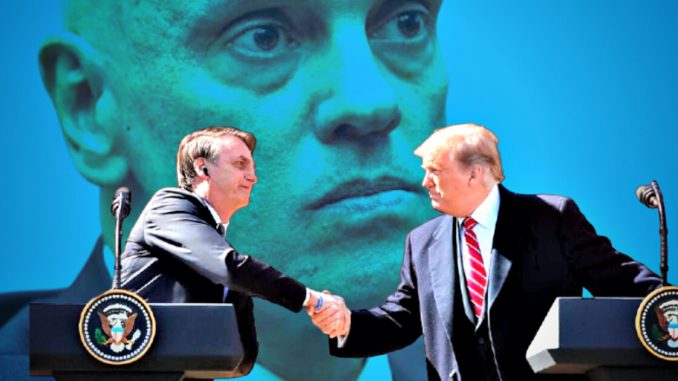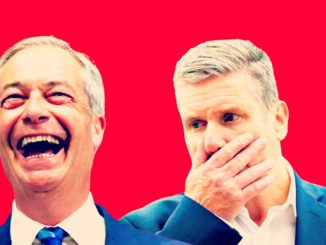
Desperate Moraes is upping the pressure in the ‘witch hunt’ against Bolsonaro.
| Published August 5, 2025
Justice Alexandre de Moraes rules Bolsonaro violated pre-trial precautionary measures imposed by the court.
🇧🇷 Jair Bolsonaro Placed Under House Arrest by Brazil’s Supreme Court
On August 4, 2025, Supreme Court Justice Alexandre de Moraes ordered former President Jair Bolsonaro to serve house arrest in Brasília ahead of his trial, citing violations of court-imposed restrictions—including a ban on public messaging through social media or third parties.
Bolsonaro had previously been ordered to wear an electronic ankle monitor, abide by a curfew, surrender his passport, and refrain from any messaging or non‑lawyer visitors. The arrest escalates after he addressed a pro‑Bolsonaro rally via the phone of his son, Senator Flávio Bolsonaro, prompting what the court characterized as continued defiance.
Only lawyers and authorized family members may visit him now, and all mobile devices in his Rio de Janeiro home have been seized.
⚖️ Legal Context: Coup Plot Allegations and Political Fallout
Bolsonaro stands accused of leading a criminal organization that attempted to overturn Brazil’s 2022 presidential election, including plans to assassinate current President Luiz Inácio Lula da Silva and Justice Moraes following the January 8, 2023, storming of Brasília’s government buildings.
The Federal Supreme Court unanimously accepted these charges in March 2025. The trial involved extensive testimony from whistleblowers and prosecution witnesses, with the case led by Justice de Moraes. If convicted, Bolsonaro faces a lengthy prison term and was already barred from public office until October 2, 2030.
🌐 Diplomatic Flashpoint: Strained U.S.–Brazil Relations
Support from Donald Trump, who referred to the legal proceedings as a “witch hunt,” has escalated tensions. In July, Trump linked a 50% tariff on Brazilian imports directly to Bolsonaro’s trial, effective August 1.
Last week, the U.S. also imposed Magnitsky sanctions on Justice de Moraes, accusing him of human rights violations and judicial overreach. The U.S. State Department condemned the house arrest, calling it a suppression of free speech and threatening accountability for those “aiding and abetting sanctioned conduct.”
🔥 Domestic Mobilization: Protests and Political Polarization
Bolsonaro’s supporters staged large protests in Rio de Janeiro and São Paulo, rallying for his release and demanding pardons. Demonstrators waved U.S. flags and publicly lauded Trump’s intervention via tariffs and sanctions.
Meanwhile, critics warn that U.S. tactics may be backfiring, strengthening Bolsonaro’s domestic support base. His legal team has vowed to appeal the house arrest order, arguing no violations occurred.
 Implications:
Implications:
Here are the key implications—both domestic and international—from the arrest and house detention of Brazil’s former President Jair Bolsonaro,
🇧🇷 1. Brazil’s Democratic Institutions Under Strain
-
Judicial assertiveness: The Supreme Court’s aggressive stance, especially by Justice Alexandre de Moraes, shows an effort to assert the rule of law and prevent further destabilization after the 2022–2023 unrest.
-
Perception of politicization: Bolsonaro’s supporters and critics of the court argue this is an overreach by the judiciary, possibly undermining public trust in democratic institutions.
🧭 Implication: A growing divide over the legitimacy of Brazil’s courts could deepen institutional distrust and embolden both radical left and right factions.
📉 2. Bolsonaro’s Political Future Severely Damaged
-
Electoral disqualification: Bolsonaro is banned from running for office until 2030, and the court proceedings could lead to imprisonment.
-
Leadership vacuum: His legal troubles may fracture the conservative right, giving rise to new figures or internal power struggles.
🧭 Implication: The Brazilian right may fragment, or possibly rebrand under a new populist leader. Bolsonaro’s personal political career appears to be nearing an end.
🇺🇸 3. U.S.–Brazil Relations at a Tipping Point
-
Tariff retaliation: Trump’s tariffs and Biden’s sanctions (if they follow) signal a new U.S. interventionist posture, driven by ideological alignment with Bolsonaro.
-
Sanctioned judiciary: U.S. sanctions on Justice de Moraes set a dangerous precedent—treating an internal legal matter of an allied democracy as a human rights violation.
🧭 Implication: This could lead Brazil to reconsider strategic alliances, warm up to BRICS, or even tighten internal controls on U.S. NGOs or diplomatic actors perceived as partisan.
🔥 4. Escalating Domestic Polarization
-
Protests and civil unrest: Large street protests in support of Bolsonaro are already erupting. With Trump-linked influence, this could turn into a larger movement or civil disruption.
-
Militarized responses: Bolsonaro still enjoys support among segments of the military and police, raising concerns about possible unrest or defiance of court orders.
🧭 Implication: Brazil faces a real threat of civil unrest in the lead-up to the 2026 elections, possibly resembling the U.S. in early 2021.
🗞️ 5. Media and Narrative Control Battles
-
Information crackdown: The court’s ban on Bolsonaro using social media (even through others) is seen by some as censorship, while others view it as critical to prevent incitement.
-
International media framing: Outlets like The Gateway Pundit frame the arrest as tyranny, while others like Al Jazeera and Reuters frame it as constitutional law enforcement.
🧭 Implication: Competing media narratives are influencing public opinion globally, making Brazil a case study in how international media polarization affects domestic outcomes.
🪙 6. Economic Risk and Investor Caution
-
Tariff consequences: U.S. tariffs will hit Brazilian exports hard, especially in agriculture and minerals—key sectors of Brazil’s economy.
-
Investor fear: Political instability, coupled with U.S. retaliation, may lead to foreign capital flight or reluctance to invest.
🧭 Implication: Brazil could enter a period of economic slowdown or stagflation, especially if protests affect infrastructure or production.
 Overall Takeaway:
Overall Takeaway:
The house arrest of Jair Bolsonaro marks a historic and deeply polarizing moment for Brazil. It underscores the nation’s continuing struggle to reconcile democratic rule of law with populist political movements. While the Supreme Court insists it is upholding justice and protecting the republic, Bolsonaro’s supporters see a judiciary intent on silencing dissent and criminalizing opposition.
Internationally, the situation has reignited old tensions, especially with the United States under Donald Trump, turning Bolsonaro’s legal battle into a geopolitical flashpoint. U.S. sanctions, economic retaliation, and public condemnations of Brazil’s judiciary may reshape diplomatic alignments in the region and beyond.
Domestically, Bolsonaro’s legal downfall could either fragment the political right or galvanize a new nationalist movement under his image. The risk of unrest, economic turbulence, and a deeper loss of faith in democratic institutions looms large.
What’s unfolding in Brazil is no longer just a courtroom drama—it’s a test of how a modern democracy handles the fallout of populism, foreign interference, and judicial authority in an age of weaponized narratives. The outcome may resonate far beyond Brazil’s borders, shaping how the world confronts similar crises in the years to come.
SOURCES: THE GATEWAY PUNDIT – BREAKING: Under Heavy US Sanctions, Brazil’s Tyrant Supreme Court Justice Alexandre de Moraes Orders the House Arrest of Former President Jair Bolsonaro
AL JAZEERA – Brazil Supreme Court orders house arrest of former President Bolsonaro
THE NEWS INTERNATIONAL – Brazil’s Bolsonaro arrested, adding to tensions with Trump





Be the first to comment